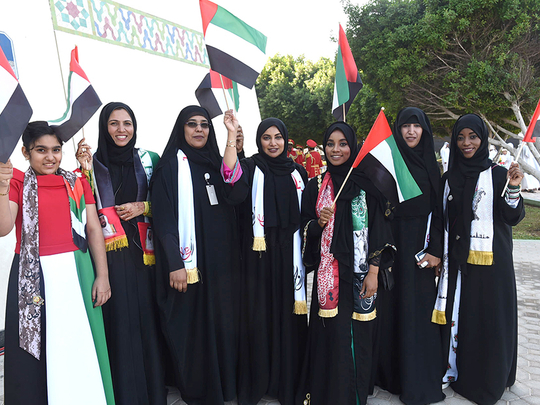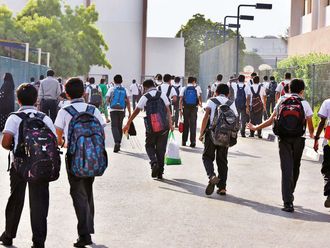
The UAE is a young country with a young population. As the nation celebrates its 45th National Day much of the energy of the country is looking ahead to a bright future that the leadership and people are united in building for themselves.
There is an exciting emphasis across the nation on the importance of people-focused topics like innovation, and their willingness to seek new challenges. No country that is mounting its own mission to Mars can be in danger of getting stuck in its past.
And the government has clearly demonstrated its determination to serve the future aspirations of the people by appointing new ministers for Youth, Future and Happiness.
"ومضات من تاريخ الاتحاد" بكلمات محمد بن راشد آل مكتوم .. قصة الإصرار والتحدي pic.twitter.com/wNbppMONjK— Dubai Media Office (@DXBMediaOffice) December 2, 2016
.@HHShkMohd, Mohammed bin Zayed & #UAE Rulers watch a film featuring the birth of our nation at #EtihadMuseum pic.twitter.com/KjsoCmZrBR— Dubai Media Office (@DXBMediaOffice) December 2, 2016
This is why the UAE does not see its heritage as an impediment to embracing the inevitable technological changes, transforming the way mankind will live, and in fact sees its heritage as a tremendous asset to be cherished.
Education
The UAE understands the importance of education and training people’s minds because it has come a very long way in only 45 years. The UAE had a very rudimentary schooling system when the federation came together: There was no nationwide network of primary schools and there were no colleges other than two technical schools.
This meant that education was very patchy across the nation, and the country launched into the century of the knowledge economy with only 40 graduates and had to scramble to find the necessary numbers of people to start to run a modern state. This is why such importance today is placed on replacing the curriculum that was introduced at that time, but had to rely far too much on learning by rote and accumulation of facts. The new pedagogical thinking is to encourage the young Emiratis to think for themselves and tackle problems on their own, which is essential training for the knowledge economy that dominates the world of the 21st century.
Institutions
After 45 years, the UAE can take just pride in the strength of its institutions. The federal system that came together in 1971 was very much a work in progress and had to develop rapidly as the country started to operate as a single entity.
There were testing moments when those who backed a more centralised system based around a unitary federal government clashed with those who sought a more devolved system based on leaving substantial areas of authority with the seven constituent emirates.
The impasse was finally resolved in 1979 when the leaders met and agreed to a more devolved system but required the emirates to commit fully to the federal ideal. This compromise is the heart of the system that has allowed the UAE to move forward with vital flexibility that allowed effective responses to changing circumstances.
Heritage and identity
A substantial part of the UAE’s underlying confidence as it deals with the modern world is its ease with its unique heritage as an Arab and Muslim nation in the Gulf. The UAE sees it as an asset rather than a problem.
This is why Minister of Foreign Affairs and International Cooperation Shaikh Abdullah Bin Zayed Al Nahyan told the UN General Assembly a few years ago that “because the UAE is a Muslim, Arab and Gulf state, therefore it is tolerant of others”. He dismissed the ludicrous argument from George W. Bush’s Washington that tolerance and democracy were special virtues of the West, and claimed them firmly for the UAE on its own merits.
The UAE has made great efforts to support what remains of its old traditions and heritage, and sees these assets as a priceless way to reinforce the national identity of the Emirati population.
The relatively small proportion of Emiratis in the UAE’s population means that it would be all too easy for young nationals to lose their way and become part of a wide international milieu made up of the many expatriates in the country.
Thus a new emphasis on the heritage of the country, coupled with the concept of active citizenship, which has been strengthened by the tragic loses in the Yemen War which has brought the whole nation together in mourning and respect for those who fought, and for those who gave their lives, in support of the ideals of the country.
Regional security
The chaos after the revolutions of 2011 brought down some of the oldest Arab states in Tunisia, Iraq and Libya, brought near-disaster to Egypt, plunged Syria into a mess and more recently triggered a civil war in Yemen.
At this time of regional crisis, the UAE was able to give a valuable lead to the Arab world by articulating its enduring faith in the rule of law, and the importance of a stable and inclusive government.
As it continues to take part in the fight to restore good governance, the UAE is finding the necessary strength by drawing on the spirit of its own identity.





